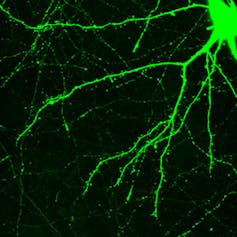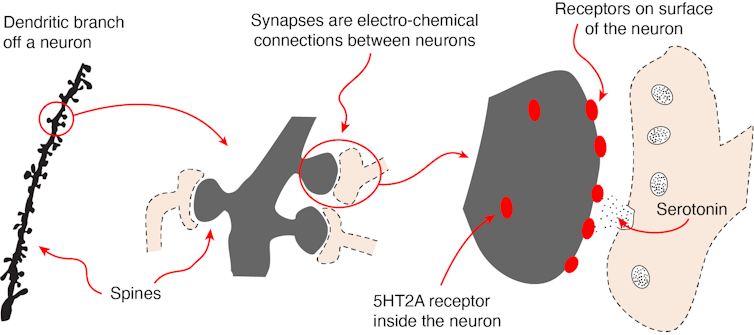Agence France-Presse
October 3, 2023

Marjan Jangjoo was a yoga and snowboarding instructor before fleeing Iran
(Christophe ARCHAMBAULT/AFP)
Swapping their state-enforced veils for T-shirts reading "life" and "liberty", a group of Iranian women who have fled to France now help make wine that traces its roots back to ancient Persia.
"We won't stop, we will keep fighting. The struggle against the mullahs, the Islamic republic, is going on here in a different way," said Marjan Jangjoo, her head bared to the rain in a vineyard in France's western Dordogne region.
"The revolution won't be done in a day, but it's on the move," she added.
Jangjoo, 32, was once a sports coach teaching aerial yoga and snowboarding near Iran's southwestern city of Shiraz.
But she fled last November when security forces came to arrest her, spending months on a gruelling slog through snowy mountains without appropriate clothing.
Jangjoo took part in the protests that erupted in the wake of the custody death of Mahsa Amini who had been arrested for allegedly flouting the dress code.
She was a member of a local Shiraz mountain club whose members were targeted by the Iranian authorities during the protest movement, with several arrested.
An experienced trekker and marathon-runner, Jangjoo eventually made it on foot to the Kurdish-controlled region of northern Iraq.
Support from people in France helped get her case noticed by the French consulate in Erbil, speeding her on the way to Europe.
In the Dordogne, "we're fighting hand-to-hand to keep our wine alive", said Jangjoo, who is now now seeking asylum in France.
Her friend Soodeh Lashkarizadeh, 33, said "the regime wants to destroy happiness, like you get from dancing, sports or drinking wine".
She fled to the Netherlands in 2018 after attracting negative attention for removing her hijab while playing cricket.
- Ancient grapes -
"There is tough repression against sportspeople in Iran, because working-class young people identify with them and sport transmits values," said Chowra Makaremi, an Iranian-born anthropologist at France's National Centre for Scientific Research (CNRS).
She backed Jangjoo's long quest to make it to France.
And it is in the vineyard of Makaremi's brother Masrour that the young women are now bringing in the harvest.
On Masrour's land in the village of Saint-Meard-de-Gurcon, vines are heavy with Syrah grapes.
The variety is closely identified with the Rhone valley in eastern France, but one legend has it that it was originally brought back from Persia by people returning from the crusades.
Makaremi ferments the wine -- a vintage set to be dubbed Cyrus after the founder of the Persian Empire -- in terracotta amphoras, rather than more typical French casks.
Inspired by 5,000-year-old methods, a natural resin derived from pistachio trees is used to seal the porous material.
Bringing history closer still is a single amphora dating to the last dynasty to hold the Persian throne before the seventh-century Arab conquest.
A small part of the wine will be fermented in the relic vessel, bought by Masrour Makaremi at auction.
- 'Same fight' -
"Iranians' aspiration to freedom isn't only about revolting against the existing regime, it is fed by deep roots in Persian civilisation," said orthodontist and neuroscientist Makaremi.
For him, producing his roughly 6,000 bottles a year is "an act of resistance joined to the rebirth of Persian culture" -- not least through "the very hands that harvest the grapes".
Makaremi sees the young women among the vines as part of the "same fight" that claimed the life of his mother, Fatemeh Zarei who was executed in 1988.
After his mother's death, Makaremi and his sister rejoined their father in exile in French city Limoges.
But he still remembers "walking with my grandmother among the vines" near his hometown of Shiraz.
The city's millenia-old wine tradition lived on in his uncle, who "made his house wine on the quiet".
Demonstrations against the regime inspired by Mahsa Amini's death appear to have died down for now inside Iran after months of harsh repression.
But Makaremi hopes against hope that he will one day plant new vines in the soil of home.
"Or else it will be my children who go after that adventure," he says.
Swapping their state-enforced veils for T-shirts reading "life" and "liberty", a group of Iranian women who have fled to France now help make wine that traces its roots back to ancient Persia.
"We won't stop, we will keep fighting. The struggle against the mullahs, the Islamic republic, is going on here in a different way," said Marjan Jangjoo, her head bared to the rain in a vineyard in France's western Dordogne region.
"The revolution won't be done in a day, but it's on the move," she added.
Jangjoo, 32, was once a sports coach teaching aerial yoga and snowboarding near Iran's southwestern city of Shiraz.
But she fled last November when security forces came to arrest her, spending months on a gruelling slog through snowy mountains without appropriate clothing.
Jangjoo took part in the protests that erupted in the wake of the custody death of Mahsa Amini who had been arrested for allegedly flouting the dress code.
She was a member of a local Shiraz mountain club whose members were targeted by the Iranian authorities during the protest movement, with several arrested.
An experienced trekker and marathon-runner, Jangjoo eventually made it on foot to the Kurdish-controlled region of northern Iraq.
Support from people in France helped get her case noticed by the French consulate in Erbil, speeding her on the way to Europe.
In the Dordogne, "we're fighting hand-to-hand to keep our wine alive", said Jangjoo, who is now now seeking asylum in France.
Her friend Soodeh Lashkarizadeh, 33, said "the regime wants to destroy happiness, like you get from dancing, sports or drinking wine".
She fled to the Netherlands in 2018 after attracting negative attention for removing her hijab while playing cricket.
- Ancient grapes -
"There is tough repression against sportspeople in Iran, because working-class young people identify with them and sport transmits values," said Chowra Makaremi, an Iranian-born anthropologist at France's National Centre for Scientific Research (CNRS).
She backed Jangjoo's long quest to make it to France.
And it is in the vineyard of Makaremi's brother Masrour that the young women are now bringing in the harvest.
On Masrour's land in the village of Saint-Meard-de-Gurcon, vines are heavy with Syrah grapes.
The variety is closely identified with the Rhone valley in eastern France, but one legend has it that it was originally brought back from Persia by people returning from the crusades.
Makaremi ferments the wine -- a vintage set to be dubbed Cyrus after the founder of the Persian Empire -- in terracotta amphoras, rather than more typical French casks.
Inspired by 5,000-year-old methods, a natural resin derived from pistachio trees is used to seal the porous material.
Bringing history closer still is a single amphora dating to the last dynasty to hold the Persian throne before the seventh-century Arab conquest.
A small part of the wine will be fermented in the relic vessel, bought by Masrour Makaremi at auction.
- 'Same fight' -
"Iranians' aspiration to freedom isn't only about revolting against the existing regime, it is fed by deep roots in Persian civilisation," said orthodontist and neuroscientist Makaremi.
For him, producing his roughly 6,000 bottles a year is "an act of resistance joined to the rebirth of Persian culture" -- not least through "the very hands that harvest the grapes".
Makaremi sees the young women among the vines as part of the "same fight" that claimed the life of his mother, Fatemeh Zarei who was executed in 1988.
After his mother's death, Makaremi and his sister rejoined their father in exile in French city Limoges.
But he still remembers "walking with my grandmother among the vines" near his hometown of Shiraz.
The city's millenia-old wine tradition lived on in his uncle, who "made his house wine on the quiet".
Demonstrations against the regime inspired by Mahsa Amini's death appear to have died down for now inside Iran after months of harsh repression.
But Makaremi hopes against hope that he will one day plant new vines in the soil of home.
"Or else it will be my children who go after that adventure," he says.
Here with a Loaf of Bread beneath the Bough,
A Flask of Wine, a Book of Verse—and Thou
Beside me singing in the Wilderness—
And Wilderness is Paradise enow.















